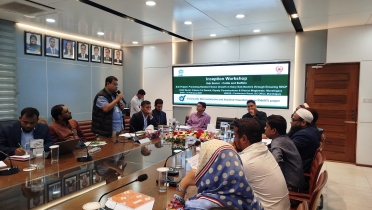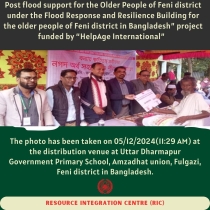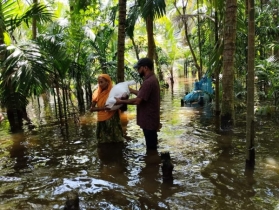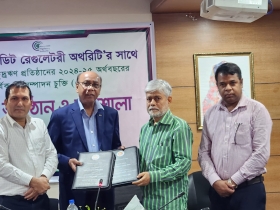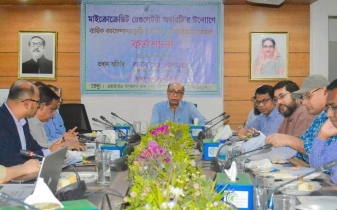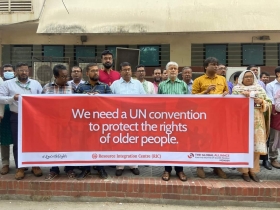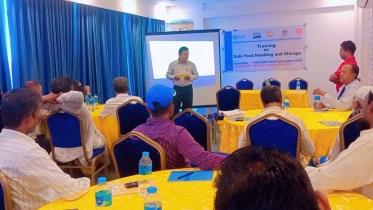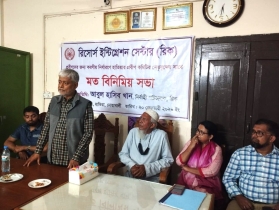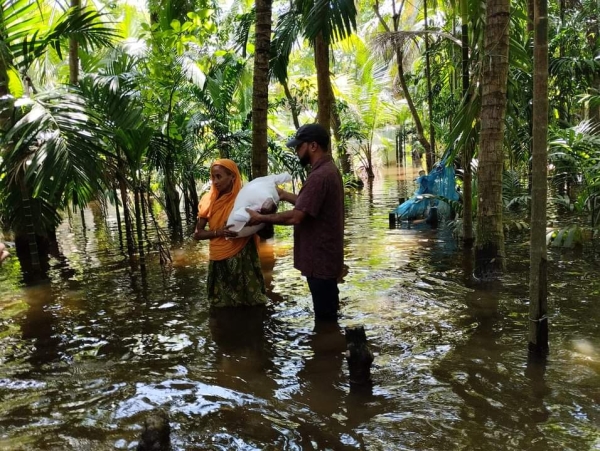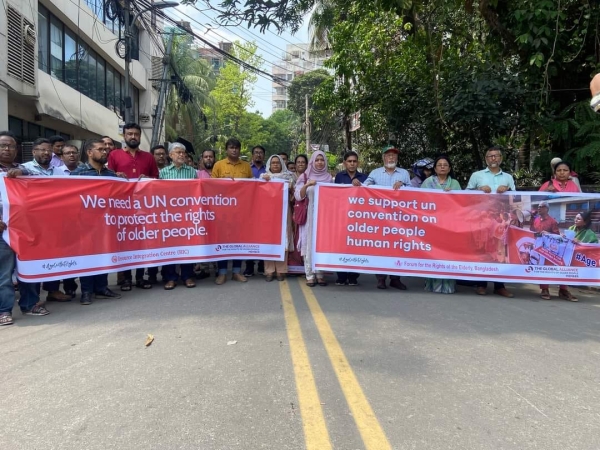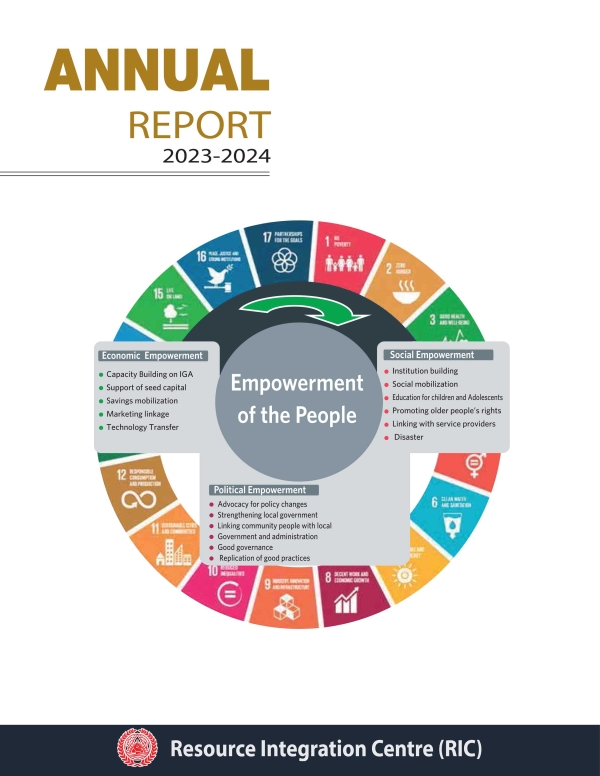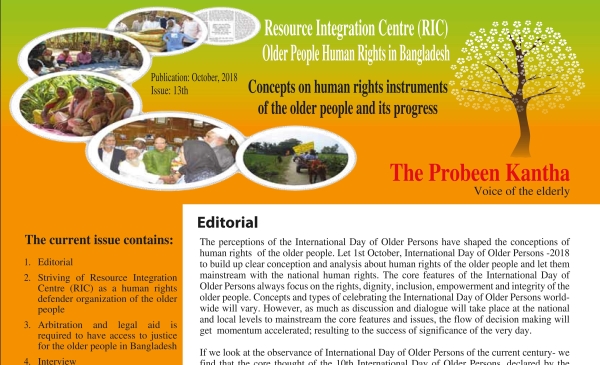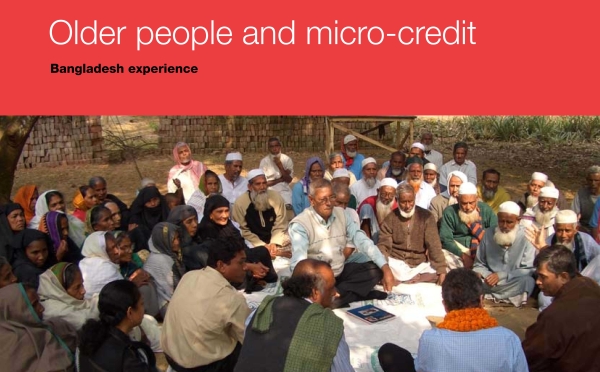Interventions with COVID-19 situation in Cox’s Bazar
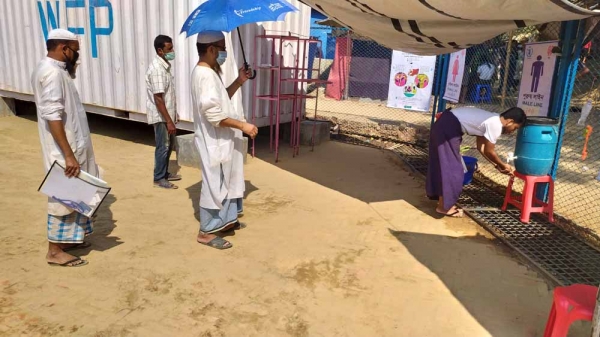
Introduction
Resource Integration Centre (RIC) has been implementing 7 regular projects (Enhance Food Security and Nutrition-EFSN, General Food Assistance-GFA, Integrated Response to the Needs of Older Men and Women-IROP, Gender Inclusive Pathways Out of Poverty in Cox'sbazar and 4 School Feeding projects in Ukhiya, Moheshkhali, Pekua and Kutibidia and at least 1 special project for COVID-19 response in different upazilas under Cox'sbazar district. Out of them 2 projects are for Rohingya refugees and other 5 are for the host communities.
As COVID-19 spreads, and gradually alerts being put on by the government all over Bangladesh, RIC suspended all the project activities except health and emergency food distribution interventions as per the government direction.
Following project activities were continued during the period:
General Food Assistances for the Rohingya refugees: RIC has been implementing an important projects with the support of World Food Program (WFP) for the Rohingya refugees, the forcibly displaced citizens of Myanmar, fled from the country's Rakhaine state, and sheltered in the Bangladesh border upazilas of Ukhyia and Teknaf under the district of Cox'sbazar, since September 2017. At present RIC is providing regular food support in two modalities i.e. in kind and e-voucher in the camps of 13 14,15,16,19 and 21 amongst 38,951 Rohingya households under the project. As the refugees have no scope to live without the regular food, the food distribution activity is continued even in the COVID-9 situation. In addition, following special assistances have been providing under COVID-19 emergency through General Food Assistance program: -
• Proving hot meals to all camps of Ukhiya and Teknaf under the Cox's Bazar District with assistance of WFP.
• Providing food package to Ramu and Chakaria Upazila 50 bed COVIV-19 isolation Centers by Assistance of WFP.
RIC has been taken the following measures to ensure food received by the refugees:
• A duty roaster prepared and number of staffs are reduced in 7 out of 30 plus for each days in the distribution points/e-voucher outlets, following camp authorities' direction.
• Special vehicle support ensured for transporting staffs to camp sites.
• Ensure the availability of hand sanitization and hand washing facilities at the entering points of retail outlets/food distribution points for staffs and beneficiaries. Use of chlorinated water ensured for hand sanitizer in the entry point of DP. Spray Machine are using for spraying Dettol water and Chlorinated water in office room and surroundings from protection from germs.
• Sufficient masks and hand gloves provided to each staff and volunteers for their office work.
• Hand micro-phone using for awareness of maintaining social distance, using masks, hand washing, maintaining coughing culture and staying at home.
• Target reduces for households' mobilization by Block volunteers.
• Household target reduced 400 to 500 HHs per day for food distribution.
• Marking have been done by Marker and colored tape in the room and seating place for Marinating social distancing for one-meter in the outlets and inside and outsides of GFD points.
• Ensuring clearly organized distribution site with one-way flow of beneficiaries with clearly marked entry and exit points
• Tick sign is maintaining instead of thumbing by beneficiaries'.
• Refugee Food Management Committee-RFMC has been formed in every Distribution Point and E- voucher outlet. They are monitoring the activities of distribution process in the distribution point and e-voucher outlet as well as in the Blocks and Sub-Blocks.
Response to the needs of older men and women project-IROP
The project focused the special age groups of older people. RIC has been implementing the project amongst both the communities of Rohingya refugees and host communities of Ukhiya, Cox'sbazar. In the refugee camps of 18, 8E and 15 and the host community areas of Anjuman Para and Fariarbill wards under Palongkhali union parishad. RIC is implementing the very unique and special project with the funding assistances from DFID, in assistance with the HelpAge International Bangladesh office since October 2017. Under this project RIC supporting older people with primary health assistances, counseling the traumatized aging people, Physiotherapy, providing necessary ageing & hygiene kits, facilitating protection services etc.

In addition, RIC has been continued special support for the older age groups to face the critical situation of COVID-19 from the very beginning. Hand wash, hand sanitizer, soap etc, have been distributing and COVID-19 awareness has been disseminating amongst the older people under this special assignment. Total number of 2219 older people, female 1105 and male 1114 covered under this emergency support
Special measures are taken to ensure safety of the health and other related staffs as much as possible:
• Duty roaster made to reduce staff numbers in the camp area as per the camp authority's direction.
• Arranged transportation for the staffs.
• Sufficient protection materials provided to the medical staffs
• Service to the beneficiaries continued through maintaining social distancing theory
• Since the first information of COVID'19 positive identification in Bangladesh, we took following initiatives to make our beneficiaries aware about the consequences of any such outbreak of the virus :
- Consulting with HAIBD, awareness raising program was undertaken initially. As part of the same an audio clip in both Rohingya and Chattogram language has been played several times at all the Age Friendly Spaces (AFS-01, Camp-18, AFS-04, Camp 8E, AFS-06, Camp15) in refugee camps and Female AFS-07 and Male AFS-09 in (Palongkhali union) host communities.
- At the same time awareness raising program has been conducted through sharing (keeping social distance) with the beneficiaries both at the camps and host communities. Besides our colleagues discussed the issue while they conducted home based care at the outreach.
- Counseling has been conducted among the beneficiaries at the AFS to remove their panic for COVID'19.
- Hand washing arrangement with adequate water and been maintaining at the entrance of each AFS, so that they could wash hands and be aware of the importance of personal hygiene and cleanliness.
- Temperature of each visiting beneficiary has been measuring by medical officers through in ferrate thermometer and is recorded in their prescription at the AFS.
- Leaflets and poster were distributed among the beneficiaries. As part of combating any outbreak of the deadly virus, an initiative had taken through distribution of packet detergent (Wheel powder 500 gm) and 2 pcs of lifebuoy soap to each of the beneficiaries (total beneficiaries are more than 10,000).
- Distribution of sanitizing materials.
Gender inclusive Pathways Out of Poverty in Ccox'sbazar-G-PoP
This is an ultra-poor livelihood support project implementing in the unions of Whykong, Hnila, Baharchora and Teknaf Sadar of Tekinaf upazila under Cox'sbazar district in support of World Vision Bangladesh. Project duration is July 2018-June 2023.
Activities ongoing during COVIDD-19 situation:
It is a high priority for awareness about corona precaution and preventive measures.
While mass gathering and physical contact approach is suspended due to COVID-19 situation and obstruction has been initiated in some places by the local government authority, and social distancing is a matter, RIC initiated an alternative strategy to disseminate some awareness amongst the group level, and even in the community or village level.

A follow up system has been developed through mobile cell phone contact for gathering information about corona aspects and disseminate other individual and project related information from, and to the G- POP project participants in Teknaf upazila.
Previously, RIC under the project has been disbursed basic need supports and conditional cash support for asset transfer to targeted project participants household through bkash account which has opened by the projects; so, all the G-POP project participants has a ROBI corporate mobile phone sim. Design of project staff one Community Facilitator had deployed for two groups belonging an average 40-45 group members and all CFs has selected from locally within the respective union. Community Facilitator is taking information through cell phone from project participants regarding corona pandemic and giving awareness about systematic hand washing, social distancing, hand sanitization and taking precaution of sneezing to the targeted households, frequently 5/6 HHs in a day keeping a documentation. Every CFs is giving information to the union assign officer sequencing one day Interval like as reporting day as Sunday, Tuesday and Thursday manner. Assign officers have taken initiative to give suggestions, session topics and other required support to the community facilitators. Four union assign officer is collecting information & report from assign union's community facilitators and compiling information & reporting regularly. Project Coordinator of G-POP is collecting report from assign officers and submitting final information to the WVB through Skype corresponding and giving any feedback/ suggestion to them for further course of action in the project related information.
 WVB has developed another reporting format which is called Situation Report (SitRep) and it is a web Link updating manner and weekly update as reporting. This report is continuing on the basis of situation regarding asset nursing and corona pandemic situation. Community Facilitators is giving information for taking preventive measure of corona pandemic and livelihood option-based asset nursing as technical method session through mobile cell phone connection.
WVB has developed another reporting format which is called Situation Report (SitRep) and it is a web Link updating manner and weekly update as reporting. This report is continuing on the basis of situation regarding asset nursing and corona pandemic situation. Community Facilitators is giving information for taking preventive measure of corona pandemic and livelihood option-based asset nursing as technical method session through mobile cell phone connection.
Special Support to Host Community (SSHC) for COVID-19 Response
In response to the endemic COVID-19 Resource Integration Centre (RIC), in cooperation with WFP, has been implementing a food and cash transfer program for vulnerable EFSN groups from April to June 2020. Number of beneficiaries are the same EFSN targeted households of 10,953.
In the month of April High Energy Biscuits have been distributed amongst extreme poorest of 13,493 (more2540 of SUSILAN targeted EFSN HHs) of HHs with 1 cartoon (5 kgs) of HEB per households. Cash and other necessary food items has been planned to distribute next month.
The distribution process initiated with the finalization of EFSN beneficiaries through previous document review and direct contact with EC members of Self Help Group (SHG). The special support mainly carried out on the basis of sound and authentic distribution plan which was finalized the RIC with WFP approval. Field staffs are well experienced in distribution approaches with almost all the key beneficiary groups. Considering the COVID-19, special support distributed among the beneficiaries through one to one interaction without any touching with each other and keeping social distance.
Security Measure during Distribution
Prior to the safety and security, WFP had done continuous email and online meeting between WFP and RIC. Besides RIC senior staff of EFSN also made a safeguard plan for distribution. Considering the safeguard plan, the following safety and security measures have been taken during disbursement in distribution point:
Mentally prepared of all CDOs and filed Staffs for distribution;
* Collected required safety and security materials from WFP;
Collections of vehicle pass for CAR/ Micros from administration;
Mobilize the beneficiaries as per the schedule to collect HEB and cash HEB onward as per schedule in a disciplined way maintaining social distance and different timing for different groups;
* Used vehicle (Micro) for female staff movement and close monitoring during reach in Distribution Point (DP);
Used hand gloves, surgical musk and hand sanitizer;
Beneficiaries took HEB without touching anyone. To avoid contamination only right /tick mark used in master roll instead of signature and finger thumbed;
* Maintained work /social / physical distances in relation to other staff;
No beneficiaries did not inform before reaching the HEB;
After reaching the HEBs, each group have informed to come in distribution point after completing the previous group;
* No one touched each other during HEB distribution;
Ensured water and soap in each and every distribution point;
* Maintained minimum 5 feet separation from one to another at all times feasible;
Did not shake hands or make other unnecessary direct contact with other staff & beneficiaries;
Did not share phones or any other personal usable items;
* Recommended to all staff and beneficiaries to change work clothes and shoes prior to arriving at home;
Coordination and Assistance
Coordination and Assistance
WFP continues to collaborate with donors as well as district and Upazila administration through active role of RIC to ensure all beneficiaries to receive HEB assistance and monitoring to a COVID-19 context and disseminating with relevant government official messaging on COVID-19 in the host community. (Approval Letter in Annex-2)

Local government (union chairman and members) are also greatly assisted to RIC to provide their consent and issuing an official letter to Upazila Administration to distribute the HEB among the beneficiaries with the support of police and army who are working entire EFSN working area to protect the people staying at home.
Challenges
EFSN Beneficiaries and Staff could be able to deal more effectively with large-scale emergencies by planning and preparing for emergencies. Despite this, EFSN staff, rural residents, communities, local governments, and others involved in emergency preparedness and response faced challenges that can include:
* Resource limitations, such as available staff, transportation, equipment and supplies, staff orientation and infrastructure;
Remoteness and geography;
Communication issues;
Delayed reaching of HEB in distribution point;
As nationwide lockdown especially quite lock down at Cox's Bazar, community people do not allow distributing anything in community level.
Despite of approval letter from Government DC, UNO and Local Government, also various questions are raised by the Police, Army and CID. They also doubted and questioned that in case of any incident (snatch, robber/dacoit) during carrying and distribution that will be responsible?
During nationwide lock down, crimes have been increased. During this current situation, any distribution in rural area is also high risk. According to sources of EFSN field staff and government deployed disciplinary persons, criminal and snatchers is finding targeting an opportunities on empty road and community level. In the meantime, there have happened some occurrences in different part of Bangladesh.
Despite of safety and security during distribution, EFSN field staff is feeling high risk. Also family members of staffs are provoking to go outside as there have been continuing locked down since March 2020.
Up chairman requested to provide support to another vulnerable people who are not included in EFSN project.
Lesson Learned
* Delayed reaching the HEB, long time had to wait of field staff which was high risk and fear of corona virus all time.
* More time exhausted due to lack of available vehicle support;
* Any occurrence may be happened during carrying or distribution by the local community or any other miscreants;
* It would be highly appreciated from local government (UP Chairman and Members), if possible to incorporate some of their beneficiaries during emergency support.
* Local government (UP Chairman and Members) annoyed to RIC for not incorporated some of their own beneficiaries beyond EFSN project.
Recommendation
* During emergency support, available vehicle should be arranged so that geographical coverage increase and distribution covered within short time; In case of any emergency, it will be better for distribution through SHG where respective CDOs and FOs will be able to distribute within short time;
* During disbursement of emergency support, as honor, it would be highly appreciated from local government (UP Chairman and Members), if possible to incorporate some of their beneficiaries during emergency support from each union which beneficiaries are not under EFSN project.

